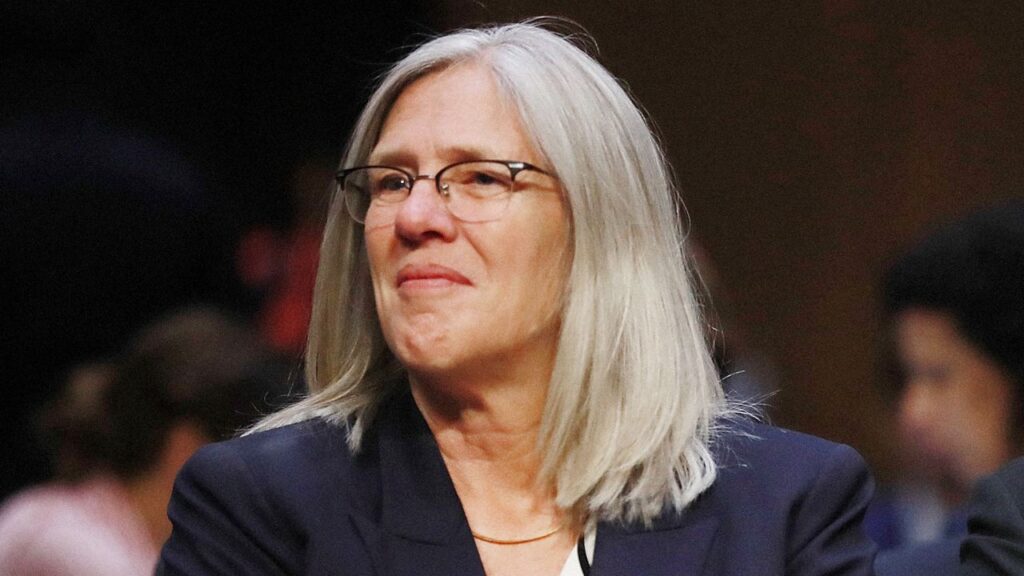“I don’t sleep a lot,” Sue Gordon admits over Zoom. Like most of us, the onslaught of headlines landing in our feeds at any given moment keeps the former principal deputy director of national intelligence—a Donald Trump appointee in 2017 who was famously forced to resign in 2019—up at night. Although, as a 29-year veteran of the CIA, Gordon has never been big on rest. Throughout her career, she has served as an analyst, helped build spacecraft, managed weapon systems, worked in combat support, and held leadership positions in the technology sector, supporting national security. “I became known as the person you called when you needed something done,” she says. As PDDNI, Gordon oversaw 17 agencies and organizations comprised of roughly 100,000 people and a budget of more than $80 billion. Most days, she was at the office by 5 a.m., worked until 7 p.m., headed home to have dinner with her husband, and then returned to the office for a few more hours before calling it a night.
Since March, Gordon, 67, has been battling an aggressive and fast-moving inflammatory breast cancer, her second bout with the disease. She found out she had uterine cancer on the day she learned Trump was going to nominate her as PDDNI, and she attended her first post-surgery radiation treatment on the morning of the day she was confirmed by the Senate.
When she got her most recent diagnosis, it was a shock on many levels: Gordon was already at stage four with the disease, which had infiltrated her lymph nodes. Her case was deemed triple negative—with no known mutations. (“My daughter jokes that I have good genes and bad luck,” says Gordon.) This meant the only course of action was immediate chemotherapy. Since then, Gordon has sustained 16 weeks of chemo, battled a near-death case of meningitis and another illness due to a dangerously low white blood count, and last month, she underwent a radical double mastectomy. Going forward, she will require alternating rounds of radiation and chemo. And yet the beauty of Sue Gordon—and this is apparent in her outlook on the United States as well—is that no matter how dire the circumstances, she remains incredibly optimistic. “Look, I can move my arm!” she says proudly post-op, while also acknowledging that “most people my age don’t make it to the surgery.” She credits her doctors for being “MacGyver-ish” in their ability to keep her alive.
While sequestered at home in Texas, close to her doctors, kids, and grandchildren, Gordon feels compelled to do something. (She jokes that she would have attended the No Kings rally had it not been the day after surgery.) Since her most recent diagnosis, she has refashioned her living room into Central Command, drawing on her years of experience and knowledge to take positive action. From the quietude of her home, the national security expert’s digital footprint looms large: She attends meetings for the multiple boards on which she serves, and sits for interviews with friends such as Nicolle Wallace and Miles Taylor. This past July, she launched her own weekly podcast, Understandable Insights: Information to Intelligence with Sue Gordon, in between rounds of chemo.
She cohosts the podcast with former Marine Eric Koepp, who also happens to be Gordon’s son-in-law. Together, the two tackle the week’s headlines with Gordon trying to demystify just what the hell is happening while assessing the ramifications. The pod has been downloaded thousands of times from 19 countries with little to no organic promotion. “I’m never going to be incendiary because that’s not the way I am, but I am getting much bolder about this moment,” says Gordon, who has tackled topical issues like the government’s approach to decommissioned nuclear warheads, the assessment of Trump’s trip to Asia, the embarrassment of the shutdown, and even the passing of Dick Cheney. (Ever the loquacious speaker, Gordon has occasionally posted bonus episodes if she can’t get all of her thoughts out in the roughly 50-minute timeframe.)

